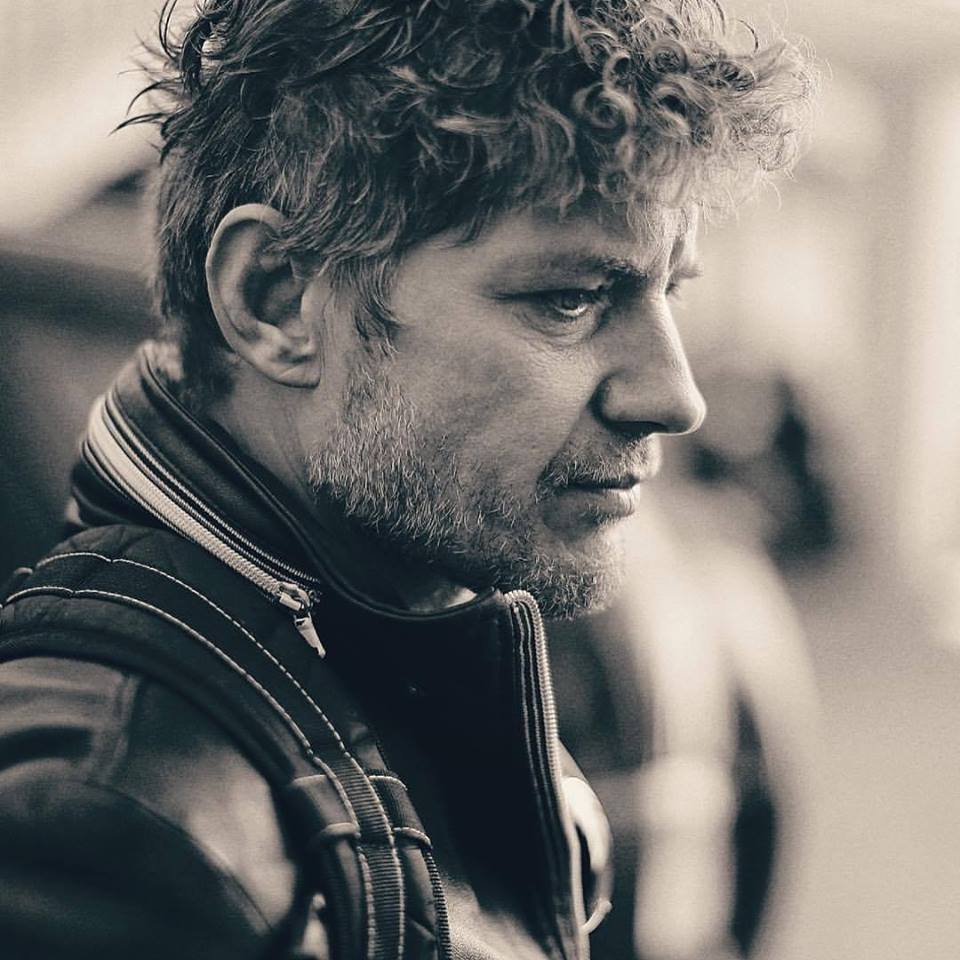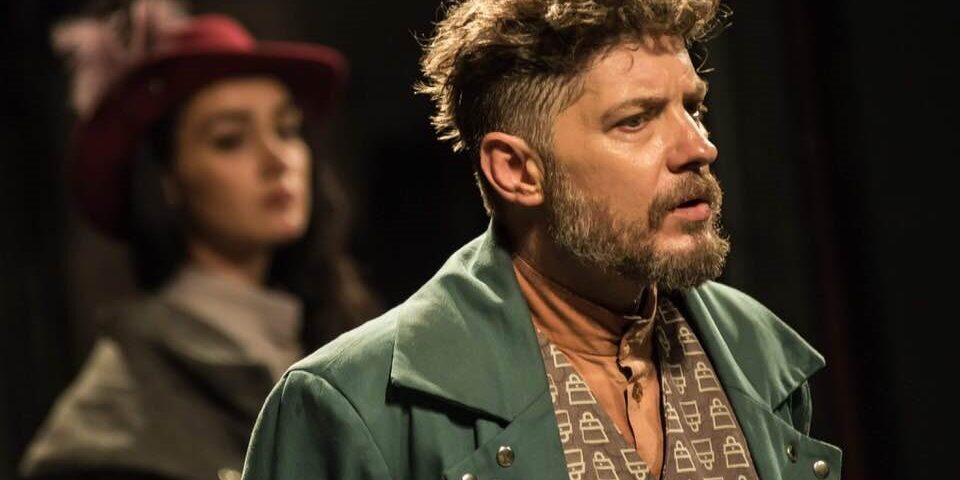Lulzim Zeqja has been a fixture of the Albanian theater scene for 20 years and is a member of the National Theater ensemble. He talks to Flamur Dardeshi about his stage and screen work and the economic challenges that face actors in Albania.
Flamur Dardeshi: What initially made you want to pursue a career in acting?
Lulzim Zeqja: My desire to become an actor first surfaced when I was a little child, and I used to spend every Sunday at the movies. I enjoyed Albanian movies, which was all I saw at the time because there weren’t many international films on our screens. Every now and then, I mimicked the actors. I also attended theater performances and, when I was a child, my parents would frequently take me to puppet shows.
There were theater groups in high school, and [Albanian actor and director] Alfred Trebicka formed one at my school. Because they were seeking guys older than me, I didn’t take part, but I often went to the gym where they had their rehearsals. After graduating from high school, I decided to compete for the Academy of Arts. But I fell short. I was the first person under the red line. Then the Ministry of Education decided to add two extra students once the class was completed, one for acting and one for directing. And, since I was the first person below the red line, I seized the chance.
Flamur Dardeshi: You were studying during the years when Albania was on the verge of a civil war. How did you find that?
Lulzim Zeqja: Albania was in a really terrible situation during those years, but I was excited to start school. I still think of my time in the faculty as one of the most wonderful periods of my life. I was lucky to have two excellent professors, Mario Ashiku and Altin Basha. Together with Altin Bashen, we created the first theater company Oazi.
Flamur Dardeshi: If we were to group actors in Albania into generations, you would be considered a member of the middle generation?
Lulzim Zeqja: They used to describe me as “a young, talented actor” until very recently – you never grow old here. However, I am 44 years old now.
Flamur Dardeshi: How do you find working with actors of different generations, both those who have more experience than you and others who have less. What is different about the way these two generations work?
Lulzim Zeqja: Working with older actors has been an education in itself for me because of the commitment that generation possesses, the way they work, and the analysis they conduct. The school teaches, but you take the training and the real school takes place when you enter the stage. I continue to grow and learn. You learn something new and different even when working with young actors today. They transmit their energy in their own unique way, they bring something new—the crispness of time. While they are growing professionally, they also revitalize me as an actor. And, they gain something from me as well. Personally, the older generations of actors have given me a lot, I greatly respect them, and I am grateful. They have given me some wonderful things, possibly unconsciously, and I incorporate those things into my profession today.
Flamur Dardeshi: How do you approach a role? Is it more methodical or more instinctual?
Lulzim Zeqja: I’m not sure how to explain it. I do not have a method. ‘Luli’s way’ is the method I use. I read the part, analyze the character. I always try to understand the character from the inside out, from the feelings, the emotions, the sensibilities, and what they stand for. I also try to understand the respective era and try to make it more relatable to myself by finding things in common with the character. That helps me make things more concrete, since you have to “wear” the character in the end, and bring it to life by giving it flesh, blood and emotion. I believe that a character devoid of emotion is pointless. If you don’t perceive an actor’s emotion, [you may as well be] reading the play.

Lulzim Zeqja
Flamur Dardeshi: Do you feel more at home on stage or screen?
Lulzim Zeqja: The theater is wonderful. The theater is magical. But I also like performing in films. I believe that a talented stage performer [can also be] a great movie actor. But a movie actor cannot perform well in a play. The theater serves as a very effective all-round ‘gym’ for actors. However, I also really enjoy film. I enjoy exploring things. I had the good fortune to collaborate with a lot of talented directors in both theater and film. Recently, I collaborated with Bujar Alimani on the movie The Albanian Virgin. The creative team was international, and that is apparent in the final product, in the cinematography, lighting, costumes. These elements make the movie. Here in Albania, they are neglected. The films produced here are of poor quality since there is no investment in these things.
Flamur Dardeshi: Since we were discussing the “abroad vs. Albania” issue, how does this apply in terms of theater?
Lulzim Zeqja: We complete a performance within ourselves. We make fun of or praise one another within our borders. We generally butter each other up at the few theater festivals that are held here. Because of this, it is difficult for us to determine whether a play is good or not. Did this piece improve the art or alter social views in respect of aesthetics? We must attend festivals outside of the country. Because when you step outside of your four walls, you encounter unfamiliar knowledge, and are able to form an objective evaluation. We cannot cooperate even with the Albanians in North Macedonia and Kosovo.
Flamur Dardeshi: Is theater criticism absent in Albania?
Lulzim Zeqja: There isn’t a criticism. I’ve been in this profession for over 21 years now. I am aware of how I perform based on my accounts, but I can’t be sure without feedback.
Flamur Dardeshi: On the one hand, there is this issue of the “lack of criticism,” but on the other hand, there is little tolerance of criticism and hostile behavior toward it.
Lulzim Zeqja: Yes, there are people who have a problem with it. For instance, I was told that King Lear, the play in which I am currently playing, had received a negative review, but when I read the review, I discovered that it was actually not that negative. Often, we don’t even know how to read [criticism].
Flamur Dardeshi: The Nationwide Theater Festival, a collaboration between the three main Albanian theaters in Skopje, Pristina, and Tirana, is back, which is at least good news.
Lulzim Zeqja: This is a very positive moment. The missing collaborations are about to begin now that the Nationwide Festival is back.
Flamur Dardeshi: You claimed in an interview that you made the decision to stay in Albania at a time when the majority of Albanians were either emigrating or were thinking about fleeing the country. Why did you make that decision?
Lulzim Zeqja: Even I sometimes become upset and tell myself I’m going to leave. Whenever I’m having a horrible day, for instance. But to be honest, I can’t perform in this profession any better than I do so here, so every time I have these moments, I choose to stay. It’s the language, it’s the style of living. I have now started a family; I have two children and I have decided to stay here and pursue this career here. I exclusively work in acting; I don’t do any other job.
Flamur Dardeshi: Is this difficult?
Lulzim Zeqja: It is very difficult economically. When the end of the month arrives, you simply pay the bills. But I am lucky enough to have a job. I feel terrible for young actors who toil for meagre wages and barely scrape by. I became aware of this major challenge during the pandemic. I wouldn’t have been able to go through those two years without the salary I receive as an actor at the National Theater. But even that salary is absurd. Due to the lack of reliable payments, there are no good products. People work three or four jobs in order to survive. You can’t dedicate yourself with your full energy; you get distracted. You occasionally tell lies. There are no good football players here because they also work as physical education teachers in order to survive. If you want good products, you need to pay the experts. I need to spend time in the library, watch movies and attend festivals. As an actor, that is my fuel.
Further reading: Besmir Betraku interview: “Directing has made me a better actor”
Flamur Dardeshi is a freelance writer based in Tirana. He has contributed in the areas of translation, analysis, and poetry. His main fields of interest are literature, cinematography, and theatre.








